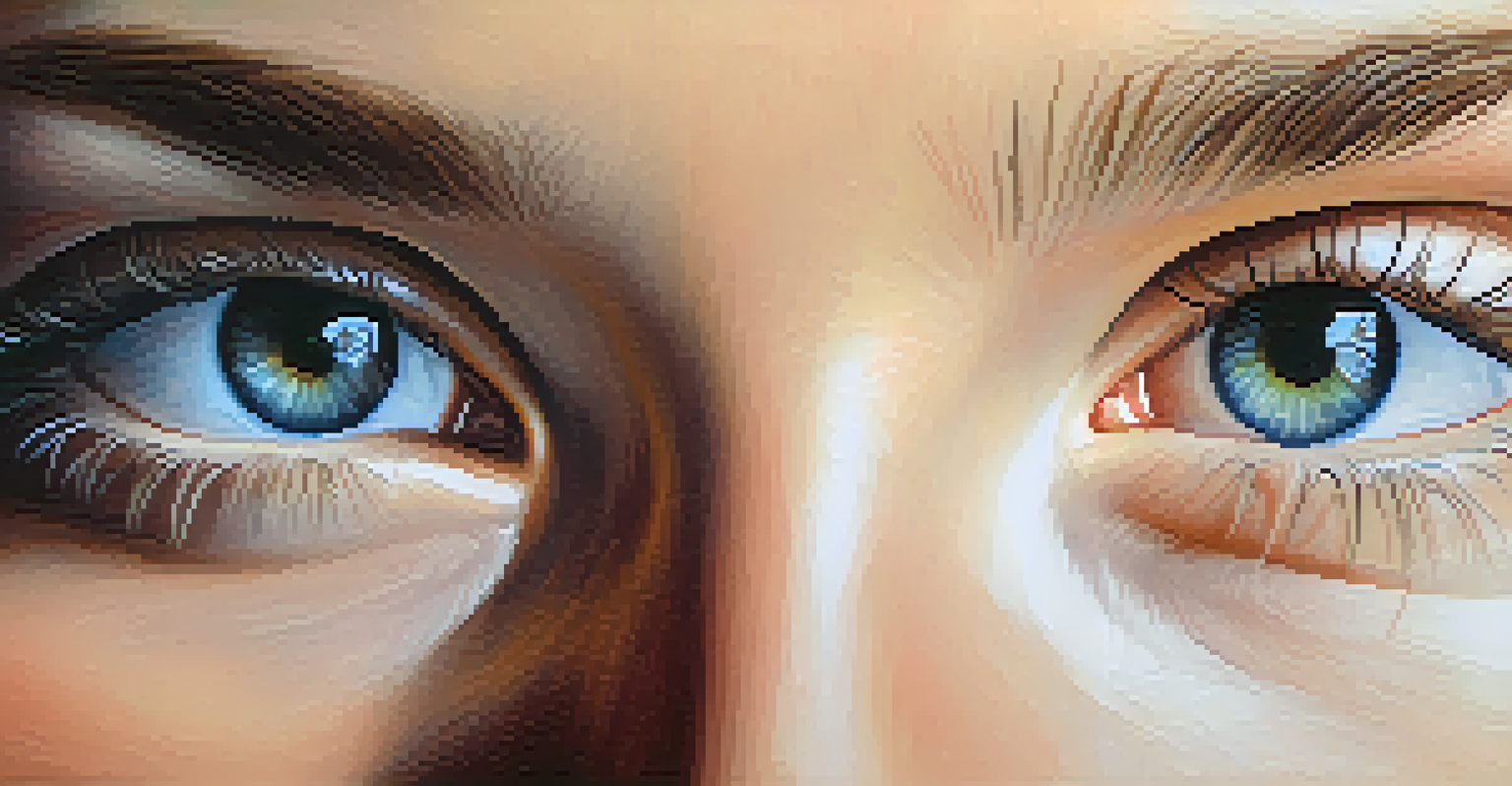The Impact of Sleep Quality on Eye Health and Wellness

Understanding the Connection Between Sleep and Eye Health
Sleep is often underappreciated, yet it plays a crucial role in our eye health. Quality sleep allows our eyes to recover and rejuvenate, ensuring they function optimally. When we sleep, our bodies engage in essential repair processes, including those affecting our eyes.
Sleep is the best meditation.
During deep sleep, the body produces melatonin, a hormone that helps regulate sleep-wake cycles and has antioxidant properties. These antioxidants are vital for protecting our eyes from oxidative stress and damage. As a result, a good night's sleep can help maintain clear vision and overall eye health.
Moreover, insufficient sleep can lead to chronic conditions such as dry eye syndrome, which can be uncomfortable and impact daily life. Understanding this connection emphasizes the importance of prioritizing quality sleep for our eye wellness.
The Effects of Sleep Deprivation on Vision
When we skimp on sleep, our eyes often pay the price. Sleep deprivation can lead to blurry vision, sensitivity to light, and difficulty focusing. These symptoms can be both distracting and frustrating, impacting our productivity and daily activities.

In addition to immediate effects, long-term sleep deprivation has been linked to more serious eye conditions, such as glaucoma. This progressive optic nerve disease can lead to irreversible vision loss, underscoring the importance of getting enough restorative sleep.
Sleep is Vital for Eye Health
Quality sleep allows our eyes to recover and rejuvenate, protecting them from damage and maintaining clear vision.
So, the next time you find yourself burning the midnight oil, remember that your eyes are silently suffering. Making sleep a priority can help safeguard your vision and enhance your overall quality of life.
Sleep Disorders and Their Impact on Eye Health
Sleep disorders, such as insomnia and sleep apnea, can wreak havoc on our health, including our eye health. These conditions disrupt normal sleep patterns, preventing the restorative sleep our bodies crave. As a result, individuals may experience a range of visual problems.
A good laugh and a long sleep are the best cures in the doctor’s book.
For example, sleep apnea can lead to increased eye pressure and contribute to the development of conditions like glaucoma. Similarly, chronic insomnia can exacerbate dry eyes, leading to discomfort and irritation. Addressing these disorders is crucial for maintaining good eye health.
Seeking help from healthcare professionals can provide the tools needed to manage these disorders effectively. By improving sleep quality, we can also improve our eye health and overall well-being.
The Role of REM Sleep in Eye Health
Rapid Eye Movement (REM) sleep is a vital phase of the sleep cycle that significantly impacts our eye health. During REM sleep, our eyes move rapidly under closed eyelids, and our brain becomes highly active. This phase is essential for cognitive functions and emotional regulation.
Interestingly, REM sleep is also linked to the health of our retinal cells. Studies suggest that this stage of sleep plays a role in processing visual information and maintaining the overall health of our eyes. Therefore, ensuring we get enough REM sleep can be beneficial for our vision.
Sleep Deprivation Harms Vision
Lack of sleep can lead to blurry vision and increase the risk of serious eye conditions like glaucoma.
Incorporating practices that promote healthy sleep patterns, such as maintaining a regular sleep schedule, can help increase REM sleep duration. This, in turn, supports our eye health and enhances our daily functioning.
Lifestyle Choices That Affect Sleep Quality
Our daily habits significantly influence our sleep quality, which in turn affects our eye health. For instance, excessive screen time before bed can disrupt our circadian rhythms due to blue light exposure. This can lead to difficulties falling asleep and reduce overall sleep quality.
In addition, consuming caffeine or large meals close to bedtime can hinder our ability to drift off peacefully. Creating a relaxing bedtime routine can help signal to our bodies that it's time to wind down, promoting better sleep.
Simple lifestyle changes, such as limiting screen time or establishing a calming pre-sleep ritual, can make a world of difference. These adjustments not only enhance sleep quality but also contribute positively to our eye health.
Tips for Improving Sleep Quality
Improving sleep quality is essential for both our overall health and our eye wellness. One effective strategy is to create a sleep environment that promotes relaxation, such as keeping the room dark and cool. Utilizing blackout curtains and managing noise levels can significantly enhance your sleep experience.
Additionally, establishing a regular sleep schedule helps regulate your body's internal clock, making it easier to fall asleep and wake up refreshed. Aim for 7-9 hours of sleep each night, as this is generally considered optimal for most adults.
Lifestyle Changes Improve Sleep
Simple adjustments, such as reducing screen time and establishing a relaxing bedtime routine, can enhance sleep quality and benefit eye health.
Finally, integrating relaxation techniques, such as mindfulness or gentle stretching before bed, can help reduce stress and promote restful sleep. By prioritizing these practices, we can improve our sleep quality and, in turn, support our eye health.
The Benefits of Quality Sleep for Overall Wellness
Quality sleep extends beyond just eye health; it plays a pivotal role in our overall wellness. Adequate sleep enhances cognitive function, emotional stability, and even immune health. When we prioritize sleep, we empower ourselves to face daily challenges with clarity and focus.
Moreover, good sleep can improve our mood and reduce stress levels, which are important for maintaining healthy relationships and achieving life goals. Feeling well-rested allows us to engage more fully in our lives and pursue our passions.

By recognizing the interconnectedness of sleep quality and overall wellness, we can make informed choices that benefit not just our eyes but our holistic health. After all, a well-rested body and mind are key components of a fulfilling life.